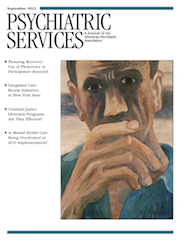Integrating Mental Health Services for Mothers of Children With Autism
Autism is one of the most common childhood mental health conditions, affecting one child per 88 children. Although up to 40% of mothers of children with autism report clinically significant depressive symptoms, there has been little attention to the mental health needs of parents. Because most autism services for young children rely on active parental engagement to deliver recommended therapies, maternal functioning directly affects the intensity and quality of therapy that children with autism receive. Developing feasible and acceptable strategies to support the mental health of mothers who care for children with autism has the potential to optimize both maternal and child functioning.
In 2009, as part of a clinical trial supported by the Combating Autism Act, our group began to offer a brief, manualized cognitive-behavioral intervention—problem-solving education—to mothers of children with new autism diagnoses and who were receiving early-intervention services authorized under Part C of the Individuals With Disabilities Education Act. Problem-solving education is an adaptation of an evidence-based depression treatment known as problem-solving therapy and is tailored to mothers of young children. It aims to strengthen an individual’s problem-solving skills as a strategy to prevent depression and improve parental involvement in intensive autism-specific therapy. Experience supports the program’s feasibility and provides a model to engage an at-risk group of parents in mental health services in a novel, home-based setting.
Problem-solving education was integrated into the existing service delivery model of early intervention, which has a national infrastructure for replication and dissemination. Early intervention provides a flexible, individualized array of therapeutic services based on a child’s needs and a family’s goals. Family support is an explicit but not fully realized aim of early intervention. Authorizing legislation allows parents as well as children to receive services. Mothers (N=37) involved in this program received six individual problem-solving education sessions (30–45 minutes) delivered biweekly at home as a supplement to early-intervention services. During each workbook-based session, mothers focused on one problem and worked through a series of problem-solving steps that included defining the problem, identifying a short-term achievable goal, brainstorming multiple solutions, evaluating their pros and cons, choosing the best solution, and developing an action plan. The most common problems that mothers selected to address were related to child rearing, followed by time management.
Time spent providing problem-solving education was billed and reimbursed in the same way as other family support services. This flexibility in the early-intervention service delivery model supports opportunities for integrating parental mental health services into a nonstigmatizing setting.
To support future replication and dissemination, we trained multidisciplinary early-intervention staff, many of whom did not have clinical mental health training, to deliver problem-solving education. Eighteen early-intervention staff completed a standardized training curriculum that included one day of didactics, followed by five practice sessions. All early-intervention staff achieved reliability within eight weeks. Fidelity was assessed in 34 randomly selected problem-solving sessions that were audiotaped and scored with a standardized form and predetermined criteria. All sessions were judged to be of excellent quality.
A major challenge confronted at the outset of the program was the belief that mothers of young children with a new diagnosis of autism would be too busy or overwhelmed to participate. The demographic characteristics of women who received problem-solving education suggested that the program successfully engaged mothers at risk of major depression. Of the 37 mothers who received problem-solving education, 75% had incomes <200% of federal poverty level and were from racial-ethnic minority groups (54%). Almost a quarter (24%) of the mothers were born outside of the United States. Although mothers were not selected on the basis of depression risk, 35% reported they had received a depression diagnosis in their lifetime and 68% had current symptoms. Seventy-five percent of mothers completed the full six sessions, supporting the program’s acceptability. Satisfaction with the program and continued use of the skills learned in the program were evaluated at the nine-month follow-up assessment. Satisfaction was high; participants reported using the problem-solving skills, such as thinking through pros and cons of solutions, and behavioral activation strategies almost weekly.
Our experience supports the feasibility and acceptability of integrating parental mental health interventions into early intervention. Offering problem-solving education expanded the range of family support options for mothers with depression risk, thereby advancing the goals of the nation’s program for children from birth to age three who have developmental disabilities. Ongoing analysis of clinical trial data will assess the efficacy of problem-solving education to decrease depressive symptoms among mothers of young children with autism.



